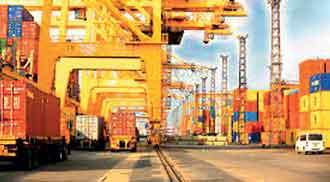06 Nov 2024 - {{hitsCtrl.values.hits}}
 Sri Lanka’s cargo clearance delays are a significant impediment to economic growth, the Ceylon Chamber of Commerce (CCC) stated in a recent report, calling for improvements in customs efficiency, inter-agency coordination, and increased use of technology.
Sri Lanka’s cargo clearance delays are a significant impediment to economic growth, the Ceylon Chamber of Commerce (CCC) stated in a recent report, calling for improvements in customs efficiency, inter-agency coordination, and increased use of technology.
The recommendations of the report, authored by CCC Economist Saumya Amarasiriwardane with Senior International Trade Facilitation Expert Dinesh de Silva, seek to ensure Sri Lanka leverages its strategic position as a major transshipment hub while addressing operational inefficiencies that hamper trade.
The Colombo Port, a vital gateway along key maritime routes, ranks among the world’s leading ports due to its deep-water capabilities and ability to accommodate large container ships. However, despite these advantages, the CCC points out bureaucratic bottlenecks are limiting the port’s role as a South Asian trade centre.
Central to CCC’s proposed reforms is the fast-tracking of the National Single Window (NSW) initiative, a digital platform that would allow traders to submit documentation once for access by all relevant government agencies, significantly reducing clearance times.
“Despite being in discussion for over 30 years, accelerating the implementation of the NSW could significantly enhance trade efficiency,” the CCC said, urging policymakers to bring Sri Lanka in line with World Trade Organization standards.
CCC’s recommendations come at a critical time as Sri Lanka seeks to stabilise its economy and attract foreign direct investment.
The CCC also advocates for the creation of a “one-stop shop” at a new customs examination yard near the Colombo Port to centralise border agency functions and expedite cargo clearance. The proposed yard would improve inspection capabilities and ease congestion at the port, providing a streamlined process for traders.
“By centralising all border agencies in a single location, this initiative streamlines the cargo clearance process, reducing delays and inefficiencies,” the report noted.
Additional measures recommended include an advanced AI-driven risk management system to enhance trade efficiency and security by identifying potential risks in shipments. The CCC believes this would allow Customs authorities to prioritise inspections, ultimately reducing unnecessary delays.
The chamber also highlights the need for public-private partnerships (PPP) to drive innovation in cargo handling and trade facilitation.
“Engaging the private sector can improve infrastructure related to cargo handling, while optimizing resource allocation and service quality,” the CCC said.
In addition, the CCC called for increased transparency and accountability, suggesting the publication of real-time data on clearance times to give businesses better visibility into their shipments and minimise uncertainties.
25 Dec 2024 25 Dec 2024
25 Dec 2024 25 Dec 2024
25 Dec 2024 25 Dec 2024